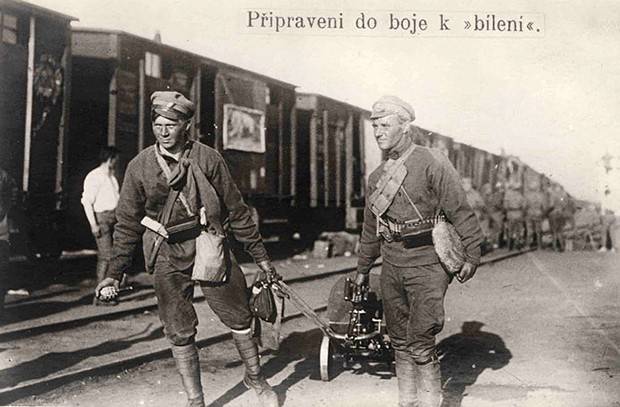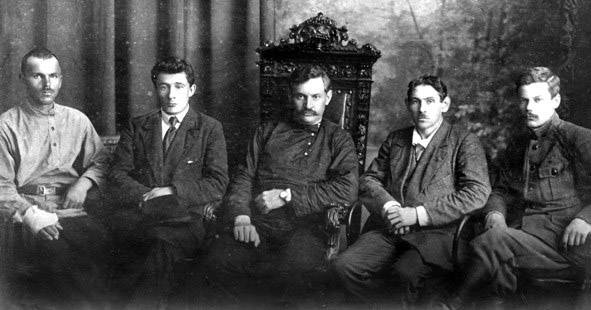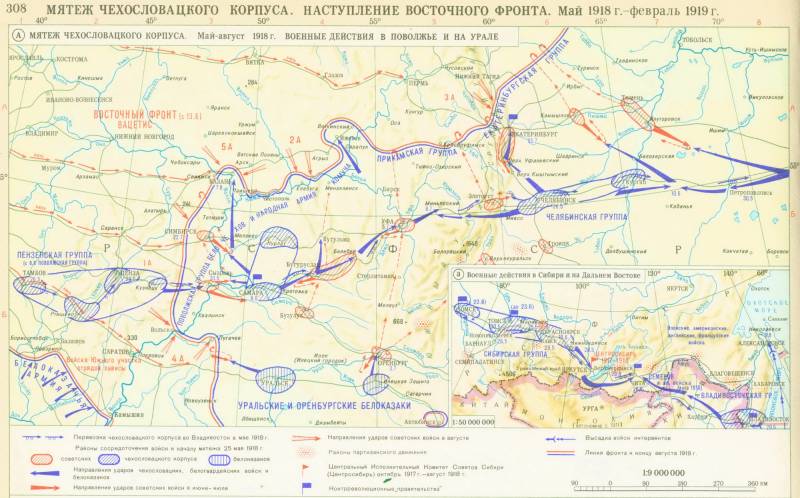Eastern Front Education
In May, 1918 began the famous uprising of the Czechoslovak Corps, which put an end to the Soviet power in the vast expanses of the Far East, Siberia, the Urals and the Volga region for a long time. Almost simultaneously, in April 1918, the Japanese landed troops in Vladivostok, which drastically changed the military-strategic, political situation in the eastern part of Russia. The governments of England and France decided to use the Czechoslovaks as a battle core for organizing the counter-revolutionary Eastern Front. The soldier of the Czechoslovak Corps managed to provoke a malicious agitation about the alleged extradition of them to Germany and Austria-Hungary, as former prisoners of war. There were clashes between the former Austro-German prisoners who were carried to the west and the Czechoslovak legionnaires who were moving to the east.
Lev Trotsky again acted as a provocateur, ordering to disarm and arrest the legionnaires. On May 25, the People’s Commissar for Military Affairs, Trotsky, sent a telegram to “all Soviets along the line from Penza to Omsk”: “All councils on the railroad are obliged to disarm the Czechoslovaks under fear of heavy responsibility. Every Czech who will be found armed on the railway lines must be shot on the spot; each train, in which there will be at least one armed, must be unloaded from the wagons and confined in a prisoner of war camp. Local military commissariats undertake to immediately execute this order, any delay will be tantamount to treason and will bring down a severe punishment on the guilty. At the same time, I am sending reliable forces to the Czechoslovak echelons, entrusted with instructing them to teach the disobedient. With honest Czechoslovakians who surrender weapon and submit to the Soviet power, to act as with the brothers and to give them full support. All railroad workers are told that not a single wagon with the Czechoslovakians should move east. ”
For their part, the leaders of the corps, represented by Chechek, Gaida, and Wojciechowski, quite deliberately conducted their game, acting on the orders of the French mission, which they had telegraphed in advance about their readiness to speak. Having developed their plan of action and coordinated it in time, the Czechoslovakians began the operation. Thus, the provocation was well prepared and she succeeded. The conflict, which could be resolved through negotiations, grew into a large-scale armed confrontation. A Czechoslovak Corps for that time was a serious force (30 - 40 thousand fighters), white and red fought in small detachments and "trains" - a few hundred and thousands of fighters.
25 May Gaida with his troops raised a revolt in Siberia, capturing Novonikolaevsk. On May 26, Wojciechowski captured Chelyabinsk, and on May 28, after a battle with local Soviet garrisons, Chechek's trains took Penza and Syzran. The Penza (8000 fighters) and Chelyabinsk (8750 fighters) groups of Czechs initially showed a desire to continue eastward. Group Wojciechowski 7 June, after a series of clashes with the red, took Omsk. 10 June she connected with echelons of Hyde. The Penza group headed for Samara, which took possession of 8 June after a minor battle. By the beginning of June 1918, all Czechoslovak forces, including local White Guards, were concentrated in four groups: 1) under the command of Chechek (the former Penza group) as part of the 5000 soldiers - in the Syzran-Samara region; 2) under the command of Wojciechowski, consisting of 8000 people - in the Chelyabinsk region; 3) under the command of Gaydy (Siberian) as part of 4000 people - in the Omsk-Novonikolaevsk region; under the command of Diterikhs (Vladivostok) as part of 14, 000 people were scattered in the space to the east of Baikal, heading for Vladivostok. The corps headquarters and the Czech National Council were located in Omsk.

Czechoslovak machine gunners
The eastern group of the Czechoslovak General Diterichs at first held passively. All her efforts were aimed at successfully concentrating in the area of Vladivostok, for which she conducted negotiations with local authorities with a request for assistance in advancing the trains. July 6 Legionnaires concentrated in Vladivostok and captured the city. 7 July, the Czechs occupied Nikolsk-Ussuri. Immediately after the uprising of the Czechs, by the decision of the Allied High Conference, the 12-Japanese division landed in Vladivostok, followed by the Americans, the British and the French (with the participation of small units from other countries). The Allies took over the protection of the Vladivostok area, and by their actions to the north and towards Harbin they provided the rear of the Czechoslovaks, who moved back west to join the Siberian group of Guyda. On the road, in Manchuria, the Diterichs group united with the troops of Horvat and Kalmykov, and in the area of Art. Olovyannoy in August established contact with the detachment of Gaida and Semenov. The Red detachments in the Far East were partially disarmed and taken prisoner, some of which left for the taiga and the mountains, blowing up bridges and leading partisan struggle.
At the same time, the process of creating white “governments” and troops begins. 8 June in Samara, was created the first such "government" - the Committee of members of the All-Russian Constituent Assembly (Komuch). It includes five Social Revolutionaries who did not recognize the January decree of the All-Russian Central Executive Committee on the dispersal of the Constituent Assembly and found themselves in Samara at that time: Vladimir Volsky, who became the chairman of the committee, Ivan Brushvit, Prokopy Klimushkin, Boris Fortunatov and Ivan Nesterov. The Committee, on behalf of the All-Russian Constituent Assembly, proclaimed itself the temporary supreme authority in the country until a new meeting was convened. The former head of the Provisional Government, Alexander Kerensky, tried to side with the activities of the Komuch government, but the Central Committee of the Social Revolutionaries Party opposed, and Kerensky left Russia forever. To fight the Bolsheviks began the formation of its own army, called "People". Already on June 9, the 1 volunteer Samara squad of 350 men was formed. The commander of the squad became Lieutenant Colonel General Staff Vladimir Kappel. 11 June Kappel squad captured the city of Syzran, 12 June took Stavropol-on-the-Volga (now Togliatti).

The first team members are I. M. Brushvit, P. D. Klimushkin, B. K. Fortunatov, V. K. Volsky (chairman), and I. P. Nesterov
On June 10, in Omsk, after the Chelyabinsk and Siberian Czech groups merged, a meeting of the Czech command was held with representatives of the new Siberian white government. The meeting adopted a plan to fight the Bolsheviks. The general leadership of the Czechoslovak troops was assigned to the corps commander of the Russian General Vladimir Shokorov. All forces were divided into three groups. The first - Western, under the command of Colonel Wojciechowski, was supposed to advance through the Urals to Zlatoust - Ufa - Samara and join up with the Penza Chechek group, which remained in the Volga region. Then they had to develop their operations against Yekaterinburg from the southwest. The second group, under the command of Syrovy, was to advance on the Tyumen railway in the direction of Yekaterinburg, in order to divert as many Soviet troops as possible and facilitate the advancement of the Western group (merged with the Penza group of Chechek) and then take Yekaterinburg together.
19 June Czechoslovakia captured Krasnoyarsk. In this they were actively helped by local anti-Bolshevik forces, which formed volunteers from among them (mainly officers). By the middle of June, local White Guard volunteers managed to form a whole so-called West Siberian army under the command of Colonel Alexei Grishin-Almazov in the cities occupied by Czechoslovakia. By June 20 in Krasnoyarsk there were already 2800 fighters of this “army”. 22 June in the area of the station Tulun on the whites and the Czechs attacked the red troops from Transbaikalia. Czechoslovakians and whites retreated to the area of Nizhneudinsk, where they managed to gain a foothold in the city. June 25 Reds began an early morning attack on Nizhneudinsk. White and Czechs fought off this attack and turned the Reds to flight. 26 June white managed to break through the red rears and destroy there the inexperienced Red Guards miners 400, who slept without guards. By July 1, whites and Czechoslovakia pushed the Reds back to Winter station. The Reds retreated towards Irkutsk, while still remaining one of their few strongholds in Siberia.
23 June in Omsk occupied by the Czechs was announced the creation of a new Provisional Siberian government to replace the "Socialist Revolutionary", which was formed in Tomsk under the conditions of the underground in February, but nowhere had real power and escaped in Harbin, China. The well-known lawyer and journalist Peter Vologda became the chairman of the new Siberian government. The “Socialist-Revolutionary” government of Peter Derber refused to recognize this “coup” and still considered only itself to be the legitimate authority in Siberia. Komuch announced the mobilization of citizens 1897 - 1898 year of birth for service in his People's Army. In a short time, the army of Komuch increased to five regiments. Its most combat-ready core was a volunteer detached infantry brigade under the command of Colonel Kappel ("Kappelevtsy").
July 3 Orenburg Cossacks entered the city of Orenburg. The power of the Bolsheviks was eliminated throughout the Orenburg province. July 5 Czechs Checheka and whites captured Ufa. Having completed the initial task of seizing the Siberian railway, the Czechs continued operations to seize the entire Urals region, advancing on Yekaterinburg with their main forces, less significant southward, towards Troitsk and Orenburg. 15 July 1918, the second meeting of the Czechoslovak command with white governments took place in the city of Chelyabinsk. At this meeting, an agreement was reached on the joint military actions of the forces of these governments with the corps. Thus, the Soviet Republic was in the ring of fronts.
Red Eastern Front
The performance of the Czechoslovakia caught the Soviet Russia at the time of the formation of its armed forces. In addition, the main forces were connected on the Don front and the Caucasus and on the line with the Austro-German troops. Therefore, Moscow could not immediately allocate large forces to fight the Czechoslovak Corps. In addition, a number of factors contributed to the rapid success and spread of Czechoslovakia. Thus, the influence of the Social Revolutionaries and Mensheviks was strong in the region. The advanced assets of the Bolsheviks were weakened by the allocation of personnel for the struggle against counterrevolution on other fronts. Often the policy of the Bolsheviks contributed to the growth of public discontent, and people supported the whites and the Czechs, when they approached, or remained neutral. The approach of the Czechs gave rise to a series of unrest and uprisings prepared by the Mensheviks and Socialist Revolutionaries. So, 11 June rebelled Barnaul. The Reds succeeded in suppressing the uprising, but this distracted their forces from the opposition of the Czechoslovakians and the Whites, who were advancing to Barnaul from the northwest, from Novonikolayevsk (now Novosibirsk). By June 14, whites and Czechoslovakians surrounded the city and began to enter it from all directions. The Reds were partly captured and executed, partly fled. 13 June 1918 an uprising broke out in the workers of the Upper Nevyansky and Rudyansky factories. 13-14 June fought between the Red Army and the local anti-Bolshevik forces that had risen in Irkutsk. There was an uprising in Tyumen. During the offensive of the Czechoslovakians at Kyshtym, the workers of Polevsky and Seversky factories arrested their councils. The uprisings also occurred at Kusinsky, Votkinsk, Izhevsk and other factories.
The Soviet government realized that a voluntary principle did not create a large and strong army. By the end of April 1918, the number of army was able to bring only to 196 thousands of people, after which the flow of volunteers began to decline. Almost until the summer of 1918, the Red Army was in the “germ”. The performance of the Czechoslovak Corps showed that only a regular army would be able to withstand a strong opponent. A decree of the All-Russian Central Executive Committee “On Forced Recruitment into the Workers 'and Peasants' Red Army” of 29 in May 1918 declared a general mobilization of workers and the poorest peasants in the 51 district of the Volga, Urals and West Siberian military districts, as well as the workers of Petrograd and Moscow. Communist mobilization began on the front. 26 June 1918, the military commissar Trotsky, sent to the Council of People's Commissars the idea of establishing universal military service of the working people. In Soviet Russia, the policy was taken to build an army on traditional principles: unity of command, restoration of the death penalty, mobilization, restoration of insignia, uniform clothing and military parades.
The Red Army in the east of the country in the first period of confrontation consisted of troops and squads, often numbering 10-20 fighters. For example, 1 of June 1918. On positions under Mias there were 13 of such units, whose total number did not exceed 1105 bayonets, 22 sabers with 9 machine guns. Some detachments consisted of conscious and dedicated workers, but with little combat experience. Others were pure "partisan". As a result, the Reds initially could not successfully resist the Czechoslovak Corps (regular formation, having experience of world war) and the White, who had experienced officer personnel. Czechs and whites, even with strong resistance, quickly found the "weak link" and broke the enemy's defenses.
13 June 1918, the Reinhold Berzin formed the North-Ural-Siberian Front. In June, the “front” was located in the Yekaterinburg-Chelyabinsk area, and numbered about 2500 people with 36 machine guns and 3 artillery platoons. The Northern Ural-Siberian Front lasted only one day. The central command also took steps to stabilize the situation in the east of the country. An order was issued to organize a unified control of the Red Eastern Front, headed by Mikhail Muravyov, who had previously commanded Soviet troops in Ukraine and tried to stop the Romanian intervention, with the title of commander in chief.
By the time they were transformed into the 3 Army, the Northern Ural-Siberian Front was providing: Yekaterinburg - Chelyabinsk direction with forces on 1800 bayonets, 11 machine guns, 3 guns, 30 sabers and 3 armored vehicles. On the Shadrinsk direction, he possessed forces in the 1382 bayonet, 28 machine guns, 10 saber and 1 armored car. In the area of Tyumen (Omsk direction) there were 1400 bayonets, 21 machine gun, 107 sabers. The reserve of these forces could become 2000 workers in Tyumen. The total command reserve did not exceed 380 bayonets, 150 sabers and 2 batteries. Thus, the formation of four red armies has begun: 1-th - in Simbirsk, Syzran and Samara directions (in the area of Simbirsk-Syzran-Samara-Penza), 2-th - on the Orenburg-Ufa front, 3-th - on the Chelyabinsk-Yekaterinburg direction (in the area of Perm - Yekaterinburg - Chelyabinsk) and the Special Army in the Saratov-Ural direction (in the area of Saratov-Urbakh). The headquarters of the front is located in Kazan.
As a result, the red managed to detain the enemy near Yekaterinburg. There was a formation of the red Eastern Front. And the performance of the Czechoslovakia allowed the enemies of Russia (internal and external) to tear away the vast territories of the Volga region, the Urals, Siberia and the Far East from the Soviet republic. It helped white to form their own governments and armies. Having seized the strategic initiative in their hands, the Czechs and the whites put Soviet power in an extremely difficult position. Soviet Russia was in the ring of fronts. The second stage of the Civil War began, more ambitious and bloody.

Information